Don't wanna be here? Send us removal request.
Text
Trends in Digital Marketing: Upcoming 13 Things Marketers Should Know
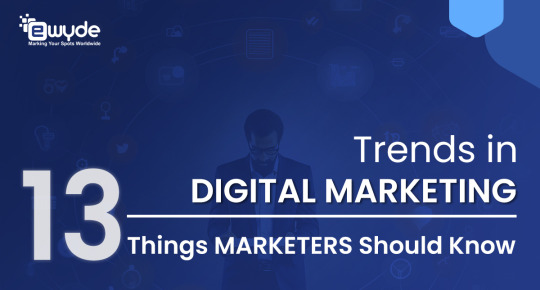
For marketers, the ultimate way to maintain the lead against the competition is getting a hold on the trends as they come, and indeed the year 2024 has a lot in store for shaping digital marketing. Here are 13 facts every marketer should know in order to maneuver through the dynamic digital landscape; they include emerging trends and new realities that will most likely present challenges as well as opportunities.
Marketing with Artificial Intelligence
Artificial Intelligence is indeed revolutionizing digital marketing with hyper-personalization, predictive analytics, and a more enriched customer experience. AI tools can take a closer look at different huge amounts of data to find and automate tasks that create content, target ads, and even segment audiences. Marketers are advised to invest in AI-powered tools to further enhance their campaigns and develop a more personalized experience to their audiences.
Optimization for Voice Search
Voice-activated devices such as Amazon's Alexa, Google's Assistant, and Apple's Siri are revolutionizing how people search for information. The expectation is that by around 2024, half of all the queries that are made available online will be made by voice. As a result, advertisers would like to make their content optimized for voice search by thinking in terms of conversational language structures, long-tail keywords, and directly responding to some of the general questions.
The Preeminence of Video Content
Video content reigns as the most powerful form of content for digital platforms, as consumers prefer to watch rather than read or listen to anything else. Upcoming platforms like YouTube, TikTok, and Instagram Reels take the preference of many users. Marketers should now find great ways to build engaging high-quality video contents to attract potential customers. It is going to be most effective with live broadcasts and short clips.
The Explosion of Social Commerce
Social media, a very solid e-commerce channel nowadays, enables people to shop directly from their feeds. Aspects of shopping have been pioneered in Facebook, enhanced Instagram, and Pinterest, thus instilling full confidence in the brands to sell. Marketers can take advantage of selling through social commerce by shoppable posts, influencer marketing, and seamless experience shopping within social apps.
Integrating Augmented Reality(AR)
Augmented reality features innovative engagement opportunities for every brand. AR facilitates customer vision in the real world about the product, such as seeing clothes on their bodies or furniture in their houses. Marketing professionals should consider using AR for creating more engaging experiences beyond typical brand contact points for customers, allowing them to immerse themselves in a product or service story.
Sustainability and Ethical Marketing
Consumers are now paying attention to whether a brand is really about and practices sustainability and ethical behavior. For marketers, 2024 will focus on how to communicate the purpose or commitment of their brands to the causes. Messages will have to be very clear regarding commitment to practices beneficial to the environment and community for purposes of ethical sourcing but also in the sense of building the trust of socially-conscious consumers towards loyalty.
Data Privacy and Security
As privacy issues about data are on the increase, marketing focus will be clear and safe directions. More legislations on data protection are coming into play: the General Data Protection Regulation or GDPR and the California Consumer Privacy Act or CCPA. It ensures data compliance, and marketers should state clearly data policies to promote confidence.
Interactive Materials
Interactive content, for example quiz competition, survey, questionnaire, or interactive infographic, is now getting increasingly important for engagement. This kind of content will promote active participation from users, making the experience engaging and memorable. To raise user interaction and gain insights, one should adequately include interactivity in the content strategies of marketers.
From Influencer Marketing Evolution
It's still powerful, but influencer marketing is evolving. Micro and nano-influencers are becoming even more valuable than mega-influencers. These offer genuine connections with tiny niche audiences. Marketers should consider engaging all sorts of influencers to be able to reach the target segment really specifically.
Omnichannel Marketing Strategies
Consumers now interact with and avail of brands from various points of contact such as social media and websites as well as retail stores. Omnichannel marketing creates a seamless customer experience across all these contact points. Marketers must link the marketing appeals they create at various channels so as to experience a unified and well-coordinated journey with the brand and ease recognition.
Programmatic Advertising
Use automated technology to do the ad buying and placement in real-time and target audiences with precision. It, therefore, improves the efficiency and effectiveness of delivering personalized ads to the right people at the right time. Marketers should, therefore, implement programmatic advertising to optimize ad spend and enhance returns on investment.
Content Experience
The shift of focus is on content experience rather than content marketing. Content experience is about the overall experience a user has with the content, such as design, layout, and interactive elements, all of which add to the level of engagement. It must be kept in mind that the content marketers have to do very beautiful user-friendly content when making such content that would really attract consumers to undergo a seamless engaging experience.
Transparency through Blockchain
Blockchain technology is adopted for transparency in digital advertising. It is used to verify impressions and clicks of an ad to increase effectiveness and cut down fraud. The ad spends will be better poured into real ad impressions. Marketers should think of blockchain solutions to improve the transparency and trustworthiness of their advertising efforts.
Conclusion
This marketing landscape is becoming nature-nurturing and complex because of the new emerging technologies and new consumer behavior shaping the touchpoints by which brands engage their consumers. Such trends could make marketers be on allowances to sight the emerging times for effective and engaging marketing strategy formulation.
Including AI-based marketing, voice search optimization, and generating videos will often take center stage, while social commerce and AR will provide alternate avenues of contacting consumers. Sustainability and ethical marketing practices, as well as data privacy, would continue to rock the trust for consumers. Interactive content, influencer marketing, and omnichannel strategies would add value to the consumer experience, while programmatic advertising and content experience would mean marketing optimization. Blockchain technology would finally bring more transparency in digital advertising.
Towards the end of 2024, when the engine of marketing is racing towards outer space, marketers must upscale the quality of their inventions to keep coming up with novel approaches to capturing and turning customers ecstatic. These are trends that make competition impossible for the brands and get them closer to the possibility of customers during this driving age.
#DigitalMarketing#MarketingTrends#AI#Innovation#MarketingStrategy#FutureOfMarketing#2024Trends#ewyde#ewydeinnovative
0 notes
Text
Why the Best Digital Marketing Agency in India is Key to Your Business Success
An organization has to keep on adapting to the changes of the online marketing spaces in the digital millennia. Whether a small start-up or a giant organization, growth is determined by how effective the digital presence is, yet the real world is tormenting in terms of understanding without proper guidance regarding digital marketing. This is where the Best Digital Marketing Agency in India becomes relevant. These are agencies with considerable knowledge about the digital trends and how to implement a custom strategy for brand improvement into their client's businesses.
Business adaptation needs constant evolution into the changing landscape of online marketing. It could either be a small startup or a well-established company. What matters most is a digital presence that forms a basis for the growth of vigorous models. The hustle and bustle of digital marketing becomes very tormentous when one lacks expert guidance. This is where the Best Digital Marketing Agency in India may come into the picture. Those are the agencies who know their stuff well, have a sound understanding of digital trends, and promise to implement a custom strategy for brand improvement into the client's business.
What qualifies a digital marketing agency in India to be regarded as the best?
It is not enough to find a team that knows how to run ads or manage social media in selecting the best digital marketing agency. It brings together all expertise, creativity, and industry knowledge to make the best digital marketing agency in India "the best." They develop effective marketing campaigns and offer strategic advice which works toward your long-term business goals.
Here’s what makes them stand out:
Complete Service Package The Most Excellent Digital Marketing Agency in India deals in a comprehensive solution for all online solutions. This includes:
SEO (Search Engine Optimization): Ensuring that your website ranks higher in search engines driving organic traffic to your site.
Pay Per Click (PPC) Campaigns: Optimizing ads paid on Google and other social media platforms to reach the right audience at the right time.
Social Media Marketing: Creating a powerful engaging presence on Facebook, Instagram, LinkedIn, and Twitter.
Content Marketing: In fact developing relevant and valued content to attract and retain them increases the awareness of brands.
Email Marketing: Craft effective messages for email campaigns to convert leads and retain customers.
Customized Solutions Based on Business Requirements
The Most Best Digital Marketing Agency In India understands that no two businesses share alike needs, challenges, and objectives; therefore, they create campaigns according to your industry, targets, and audience instead of giving the same formula to every client. They perform an extensive survey and analysis of the competitors before creating campaigns that will maximize your ROI and help you carve out a niche for yourself.
Creative application of technology Indian digital marketing agencies are always ahead of the curve when it comes to technology. They all use the latest and best tools, software, and platforms to ensure that the marketing campaigns you have are both efficient and effective. From automation in email marketing to using a sophisticated analytics tool to track campaign performance, the best agencies in India make sure your marketing efforts stand out using technology.
The Benefits of Working with the Best Digital Marketing Agency in India
1. Cost-efficient India is aesthetically blessed in the sense that it has huge numbers of thoroughbred digital marketing professionals at very competitive prices. The business entrepreneurs are approached to link up with the Best Digital Marketing Agency in India, and they are likely to take world-class services at far low amounts. The costing often associated with Indian agencies gives companies a hefty return on investment, making it a cost-effective option for businesses of all sizes.
2. Growing Brand Recognition and Awareness One of the main purposes of digital marketing is to increase the visibility of a brand. The Best Digital Marketing Agency in India will apply proper search engine optimization strategies to get your brand listed as the best in the world. They will also write attractive content and plan campaigns in such a way that your brand is well known to the right customers, creating trust through awareness.
3. Actual Measurable Results and Analytics When digital marketing solutions put measurable results, digital marketing leaves an avenue for measuring the results. It gives detailed reports keeping in focus web traffic, lead conversions, as well as social engagement, enabled by the Best Digital Marketing Agency in India. The visibility allows for making reasonable decisions, and at the same time, provides the agency with the possibility of enhancing current campaigns to yield better results.
4. Experts in Penetrating the Indian Market Indians have their own consumer behavior, different preferences and digital habits from anywhere in the world. Partnering with the best digital marketing agency in India only means having access to a team that understands every local nuance. From language to cultural differences and regional preferences, these agencies specialize in targeting the right demographic through the right message, ensuring effective communication and engagement.
How the Best Digital Marketing Agency in India Can Help Your Business Grow
Building Stronger Customer Relationships-and-more-Within
Digital marketing is not just about attracting new customers; instead, it is about creating connections with the current audience. The Best Digital Marketing Agency in India understands how to keep using the techniques of content marketing, email marketing, and social media engagement. All they need to do is give value consistently, help in creating customer loyalty, which is always essential for long-term growth in business.
The business today's market is digital, and that digital space claims to be the most competitive field. Pro-activity and adaptive behavior are a must in this regard. The Best Digital Marketing Agency India will help you with understanding the trends and dynamic media. From search engine algorithm updates to consumer behavioral changes, it can do anything to keep your business aligned with these most current trends, strengthening competitive advantage over others.
Extending Your Reach-Global Perhaps, this is the reason you will find a digital marketing agency in India that can offer you an export that would help you go beyond local borders and be global. These could include international SEO, localized content strategy, and global ad targeting among other techniques that would allow penetration of new markets and buoyant growth in business internationally.
Conclusion
It has become crucial for companies to have good digital marketing strategies in a world that becomes more digital each day. You can't do without the Best Digital Marketing Agency in India that will have you in touch with a team of experts who work on personalized strategies made just for you, whether you're driving traffic or improving conversion rates. From brand-building to loyalty development, the best agencies in India have it all, and you will be aided at whatever stage.
You can partner with the right digital marketing agency and take your business to a new level, a higher online presence, and faster formula attainment of business goals.
0 notes
Text
Digital Marketing in Compliance with the Trends of the Moment
When it comes to running a successful business in this modern world that is more reliant on technology than ever, keeping a tab on the digital marketing trends is very important. This is because the scenario has been changing for the past few decades and organizations have to embrace the new developments in order to remain in the race. Being one of the top firms specializing in digital marketing and advertising services, we appreciate the need to take these trends into consideration in order to enhance the clients’ online presence, thereby promoting growth.
The ascension of Artificial Intelligence
One of the notable developments in digital advertising is the use of artificial intelligence. Marketing has become more effective and personalized owing to how artificial intelligence (AI) has changed our way of doing business. From customer care chatbots to complex systems that analyze the market and predict the preferences, values and behaviors of the target audience, an advertising agency, and a digital marketing company is able to provide the audience with focused experiences. With the help of AI, such companies are able to enhance their attribution models leading to better results in marketing.
The Significance Of Video Marketing
The increasing reliance on video content in the digital space today makes it hard for any marketing strategy to succeed without incorporating it. The rise of such platforms as YouTube, Tic Tok, and Instagram Reels has attracted an influx of businesses in the quest to reach their audience in new ways. A digital marketing and advertising agency devises and produces stunning videos that grab attention. It does not matter what the context of the video is: it can be a product overview, a shooting scene, or a quick recap about the customers. It is easy to understand why the videos come in handy whenever a company needs to talk about the products and services they offer.
Adoption of Social Commerce Concepts
Social media platforms are no longer exclusively used for communication; thanks to their advancement, they serve as efficient sales tools. Any social network such as Facebook that incorporates online shopping or electronic commerce is referred to as social commerce. This unprecedented advancement has created new ways for a digital marketing and advertising company to engage prospective clients whenever they are available, which is almost all the time. By enabling shopping options on Instagram and Facebook, for instance, companies make it easier for clients to make purchases and in return increase their sales.
Exploiting Influencer Partnerships
Influencer marketing turned out to be one of the digital marketing strategies. The band utilizes the existing trust and authority of their designated followers through the influence of the stars. A marketing agency, including the one I work for, understands the importance of these relationships by allowing the business to target its audience and increase brand awareness. The followers relate to the influencer's connection with their products and services and thus the influencer is able to create noise and mind share for the product.
Emerging Trends in Privacy and Data Protection
As the stakes around data privacy continue to increase, digital marketing practices are becoming more focused on fair and ethical strategies. Customers are becoming educated on how their information is handled and are channeling their demand towards controlling access to such information. Any reliable marketing and advertising firm in the digital space should embrace data safety as a core value as well as adhere to regulations such as General Data Protection Regulation laws or California Consumer Privacy Act. When processes are clear and honest, promoting trust among consumers, a business can hope for a healthy process of nurturing long lasting relationships with customers.
The significance of omnichannel marketing cannot be overemphasized.
In this contemporary world, where everything is connected, people use multiple channels to engage with a particular brand. As such, effective digital marketing strategies must incorporate an omnichannel approach where customers enjoy a smooth and uniform experience. Whether through social media or rather email marketing, search engines or mobile applications, a digital marketing and advertising agency must come up with consistent campaigns that bear the same message whilst reaching out to all mediums. This approach to marketing, apart from helping customer satisfaction, also promotes better engagement resulting in conversion rates optimization.
Conclusion
With the continuing advancement of the digital trend, organizations must keep track of the prevailing trends to be competitive. In this case, a digital marketing and advertising company can help a brand achieve its goals by integrating innovative tools and methods, including AI, video marketing, social commerce, influencer marketing, data protection, and omnichannel marketing strategies. Looking to the future of these trends not only improves your marketing but also facilitates your place in the market as a true businessman in this digital era.
#digital marketing company#digital marketing companies#digital marketing and advertising company#top digital marketing companies#best digital marketing company
0 notes
Text
A Step-by-Step Guide to Perfecting Your Content Creation Process
In the digital age, content is king. Whether you're a marketer, a blogger, a business owner, or simply someone passionate about sharing knowledge, mastering the content creation process is essential for standing out and effectively engaging your audience. This comprehensive guide will walk you through each step of the content creation process, from ideation to promotion, helping you craft compelling and impactful content.
1. Understanding Your Audience
The first step in creating great content is knowing your audience. Understanding who you are creating content for will inform your entire process.
Create Buyer Personas: Develop detailed profiles of your ideal audience members, including demographics, interests, and pain points. This will help you tailor your content to meet their needs.
Conduct Audience Research: Use surveys, interviews, and analytics to gather insights about your audience's preferences and behaviors. Tools like Google Analytics and social media insights can provide valuable data.
Engage with Your Audience: Leverage social media platforms, forums, and comment sections to interact with your audience. Ask questions and seek feedback to better understand their needs and preferences.
2. Ideation and Planning
Once you have a clear understanding of your audience, it’s time to brainstorm ideas and plan your content.
Brainstorm Content Ideas: Use techniques like mind mapping, word association, or even a simple brainstorming session to generate a list of topics that would interest your audience.
Utilize Content Calendars: Create a content calendar to organize your ideas, set deadlines, and plan for important dates (like holidays or product launches). This will help you maintain consistency in your content creation.
Choose Content Types: Decide what types of content you will create—blogs, videos, infographics, podcasts, or social media posts. Each format serves different purposes and resonates differently with audiences.
3. Research and Development
Research is a crucial part of the content creation process, as it provides the foundation for credible and valuable content.
Gather Information: Collect data from reputable sources, including articles, studies, and expert opinions related to your topic. Ensure that you fact-check your information to maintain credibility.
Identify Trends: Stay updated on industry trends and current events. Use tools like Google Trends or BuzzSumo to discover what topics are currently resonating with audiences.
Outline Your Content: Create a structured outline that organizes your ideas logically. This will serve as a roadmap for your writing, ensuring you cover all necessary points.
4. Content Creation
With a solid plan in place, it’s time to start creating your content.
Write with Purpose: Begin drafting your content based on your outline. Focus on delivering value and addressing the needs of your audience. Use clear and concise language, and avoid jargon unless it’s appropriate for your audience.
Use Engaging Formats: Incorporate visuals, such as images, videos, and infographics, to enhance the user experience. Break up long blocks of text with headings, bullet points, and short paragraphs to improve readability.
SEO Optimization: If you're creating online content, don’t forget to optimize for search engines. Use relevant keywords, meta descriptions, and alt tags for images. Tools like Yoast SEO can help you optimize your content effectively.
5. Editing and Proofreading
The editing phase is crucial for refining your content and ensuring it meets quality standards.
Revise for Clarity and Flow: Read through your content multiple times to identify areas for improvement. Ensure that your ideas flow logically and that your writing is clear.
Check for Grammar and Spelling: Use tools like Grammarly or Hemingway to catch grammatical errors and improve readability. However, always do a manual proofread as automated tools can miss nuances.
Seek Feedback: If possible, have a colleague or friend review your content. Fresh eyes can catch mistakes you might have overlooked and provide valuable input.
6. Publishing and Promotion
Once your content is polished and ready, it’s time to share it with the world.
Choose the Right Platform: Decide where to publish your content based on your audience’s preferences. This could be your website, social media platforms, or third-party sites.
Utilize Social Media: Promote your content across your social media channels. Create engaging posts that highlight key points and include eye-catching visuals.
Engage with Your Audience: Respond to comments and messages. Engage in discussions about your content to build a community and encourage further sharing.
7. Analyzing and Iterating
The final step in the content creation process is analyzing the performance of your content and making improvements.
Track Performance Metrics: Use analytics tools to monitor key performance indicators (KPIs) such as page views, engagement rates, and conversion rates. This data will help you understand what works and what doesn’t.
Gather Feedback: Encourage your audience to provide feedback on your content. This can be done through comments, surveys, or social media interactions.
Iterate and Improve: Use the insights gained from your analysis to refine your content strategy. Experiment with different formats, topics, and promotion techniques to see what resonates best with your audience.
Conclusion
Mastering the content creation process takes time and practice, but by following this ultimate guide, you can develop a structured approach that leads to high-quality content. Remember, the key is to remain adaptable and open to change. As you continue to learn and grow, your content will become increasingly effective in capturing and engaging your audience. Happy creating!
#digital marketing#digital marketing company#top digital marketing companies#digital marketing company near me#digital marketing and advertising company
0 notes
Text
How AI Is Transforming The Marketing Industry
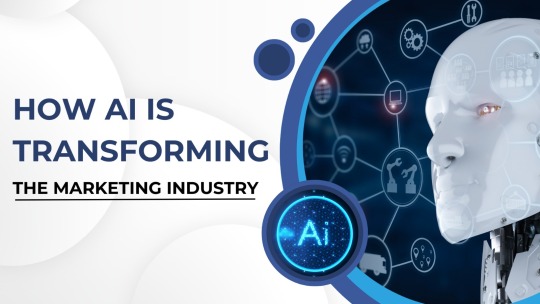
In the ever-evolving landscape of the marketing industry, artificial intelligence (AI) has emerged as a transformative force, revolutionizing the way businesses engage with their customers and optimize their marketing strategies. From personalized customer experiences to predictive analytics, AI is reshaping the marketing paradigm, enabling companies to achieve unprecedented levels of efficiency, accuracy, and effectiveness.
Personalization at Scale
One of the most significant impacts of AI in marketing is the ability to deliver personalized experiences at scale. Traditional marketing efforts often relied on broad segmentation and generalized messaging, but AI has empowered marketers to tailor their communications to individual preferences and behaviors. Through machine learning algorithms, AI can analyze vast amounts of data to understand customer preferences, purchase history, and browsing behavior. This allows marketers to create highly targeted campaigns that resonate with each customer on a personal level.
For instance, AI-driven recommendation engines, such as those used by e-commerce giants like Amazon and Netflix, analyze user data to suggest products or content that align with individual tastes. This level of personalization not only enhances the customer experience but also drives higher engagement and conversion rates. According to a study by Epsilon, 80% of consumers are more likely to make a purchase when brands offer personalized experiences.
Enhanced Customer Insights
AI's ability to process and analyze large datasets quickly and accurately has revolutionized market research and customer insights. Traditional methods of gathering customer feedback, such as surveys and focus groups, are often time-consuming and limited in scope. AI-powered tools, on the other hand, can analyze social media conversations, online reviews, and other forms of unstructured data in real-time, providing marketers with deeper and more comprehensive insights into customer sentiment and preferences.
Sentiment analysis, a technique powered by natural language processing (NLP), allows marketers to gauge public opinion about their brand, products, or services. By understanding the emotions and opinions expressed in online conversations, companies can make informed decisions about their marketing strategies and product development. For example, if a significant number of customers express frustration about a particular feature of a product, businesses can proactively address the issue and improve customer satisfaction.
Predictive Analytics for Better Decision-Making
Predictive analytics is another area where AI is making a substantial impact. By analyzing historical data and identifying patterns, AI can predict future trends and customer behaviors. This enables marketers to make data-driven decisions and optimize their campaigns for better results.
For instance, AI can help businesses forecast demand for their products, allowing them to adjust their inventory levels and marketing efforts accordingly. Additionally, predictive analytics can identify potential churn risks, enabling companies to implement retention strategies before losing valuable customers. According to a report by Forrester, companies that use predictive analytics are 2.9 times more likely to report revenue growth.
Automation of Routine Tasks
AI has also brought significant advancements in marketing automation, streamlining routine tasks and freeing up marketers to focus on more strategic initiatives. Chatbots, powered by AI and NLP, can handle customer inquiries, provide product recommendations, and even assist with the purchasing process. This not only improves customer service but also reduces operational costs.
Email marketing is another area where AI-driven automation has proven invaluable. AI can segment email lists, personalize content, and determine the optimal time to send messages, resulting in higher open and click-through rates. According to a study by Campaign Monitor, marketers who use segmented campaigns note as much as a 760% increase in revenue.
Content Creation and Curation
AI is also transforming the way content is created and curated. Natural language generation (NLG) algorithms can produce written content that is virtually indistinguishable from human writing. This technology is being used to generate product descriptions, news articles, and even social media posts. For example, The Washington Post's AI tool, Heliograf, has been used to cover news stories and generate reports on the Olympic Games.
Content curation, the process of finding and sharing relevant content with an audience, is another area where AI excels. AI-powered tools can sift through vast amounts of information to identify high-quality content that aligns with a brand's messaging and audience interests. This not only saves time but also ensures that the content shared is relevant and engaging.
Improved Advertising Strategies
AI has revolutionized digital advertising by enabling more precise targeting and optimization of ad campaigns. Programmatic advertising, which uses AI to automate the buying and selling of ad space, allows marketers to reach their desired audience with greater accuracy and efficiency. AI algorithms analyze user data, including demographics, interests, and online behavior, to serve ads to the most relevant users at the right time.
Additionally, AI-powered tools can optimize ad creatives by testing different variations and identifying the most effective ones. This continuous optimization leads to higher click-through rates and better return on investment (ROI). According to a report by PwC, AI could boost global GDP by up to $15.7 trillion by 2030, with marketing and advertising being significant beneficiaries.
Ethical Considerations and Challenges
While the benefits of AI in marketing are substantial, it is essential to address the ethical considerations and challenges associated with its use. Privacy concerns are at the forefront, as AI relies heavily on data collection and analysis. Marketers must ensure that they are compliant with data protection regulations, such as the General Data Protection Regulation (GDPR), and prioritize transparency in how customer data is used.
Moreover, there is the challenge of maintaining a balance between automation and human touch. While AI can handle many tasks efficiently, human creativity and empathy remain irreplaceable in crafting compelling narratives and building genuine connections with customers. Marketers must find ways to integrate AI seamlessly into their strategies without compromising the human element that makes their brand unique.
Conclusion
AI is undeniably transforming the marketing industry, driving innovation and enabling businesses to connect with their customers in more meaningful ways. From personalized experiences and enhanced customer insights to predictive analytics and automation, AI offers a plethora of opportunities for marketers to optimize their strategies and achieve better results. However, it is crucial to navigate the ethical considerations and maintain a balance between AI and human touch to fully harness its potential. As AI technology continues to evolve, its impact on marketing will undoubtedly grow, shaping the future of the industry in ways we can only begin to imagine.
0 notes
Text
Canva's AI Updates: Enhancing News Content Creation and Digital Marketing
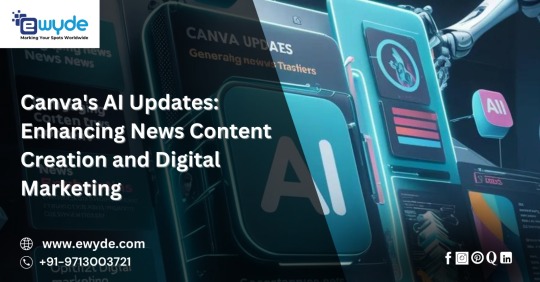
In an ever-evolving digital landscape, staying ahead of the curve is crucial. Canva, the go-to design platform for many, has made significant strides with its recent AI updates, aimed at revolutionizing news content creation and digital marketing. Let’s dive into how these advancements are transforming the way we create and consume content.
The Power of Canva's AI in News Content Creation

Streamlining the Design Process
One of the most significant challenges in news content creation is the time-consuming nature of design. Canva's AI-driven tools simplify this process, allowing journalists and content creators to focus on what they do best: storytelling. The AI suggests design elements, layouts, and color schemes that align with the content’s theme, ensuring a cohesive and professional look without the hassle of manual adjustments.
Enhanced Visual Storytelling
Visuals play a crucial role in news content, helping to capture readers' attention and convey complex information quickly. Canva’s AI can generate infographics, charts, and interactive elements based on the data provided, making it easier to present data-driven stories in an engaging manner. This capability is particularly beneficial for investigative journalism, where presenting data clearly and compellingly is key.
Automated Content Generation
Canva’s AI doesn’t just assist with design; it can also help generate content. By analyzing trending topics and popular keywords, Canva suggests headlines, summaries, and even full articles. This feature is invaluable for newsrooms with tight deadlines, ensuring that they can produce high-quality content at a rapid pace.
Transforming Digital Marketing with Canva's AI

Personalized Marketing Campaigns
In digital marketing, personalization is king. Canva's AI enables marketers to create highly personalized campaigns by analyzing user data and behavior. It suggests tailored visuals and messaging that resonate with specific audience segments, leading to higher engagement and conversion rates.
Optimized Ad Creatives
Creating effective ad creatives is often a trial-and-error process. Canva’s AI streamlines this by analyzing past performance data to suggest the best-performing designs and formats. This data-driven approach not only saves time but also ensures that marketing budgets are spent more efficiently.
Social Media Content Automation
Social media is a critical component of any digital marketing strategy, and Canva’s AI makes managing it easier than ever. The AI can generate posts, stories, and ads optimized for various platforms, complete with recommended hashtags and posting times. This automation allows marketers to maintain a consistent and effective social media presence without the usual manual effort.
Data-Driven Insights
Understanding what works and what doesn’t is essential for any marketing campaign. Canva's AI provides in-depth analytics and insights, helping marketers to refine their strategies continuously. By offering data on engagement rates, audience demographics, and content performance, Canva ensures that marketers can make informed decisions and adjust their tactics in real-time.
The Future of Canva and AI
The integration of AI in Canva is just the beginning. As the technology evolves, we can expect even more sophisticated tools that will further enhance content creation and digital marketing. For instance, we might see AI that can predict future trends, allowing creators to stay ahead of the curve. Additionally, more advanced natural language processing could enable even more nuanced and context-aware content generation.
Canva's AI updates are a game-changer for news content creation and digital marketing. By automating and optimizing various aspects of these fields, Canva is empowering creators to produce high-quality content quickly and efficiently. Whether you’re a journalist looking to tell compelling stories or a marketer aiming to craft impactful campaigns, Canva's AI tools are invaluable assets in your toolkit. As AI technology continues to advance, the possibilities for innovation in content creation and digital marketing are virtually limitless.
0 notes
Text
The Role of NFTs in Digital Marketing: What You Need to Know
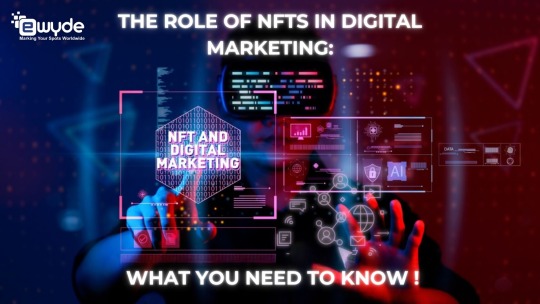
In recent years, Non-Fungible Tokens (NFTs) have revolutionized various sectors, from art and gaming to real estate and entertainment. But their impact isn't limited to just these areas. NFTs are also making waves in digital marketing, presenting new opportunities for brands to engage with their audiences in innovative ways. Here’s what you need to know about the role of NFTs in digital marketing.
Understanding NFTs

Before diving into their role in digital marketing, it's essential to grasp what NFTs are. NFTs are distinct digital assets that have been blockchain-verified. Unlike cryptocurrencies such as Bitcoin or Ethereum, which are interchangeable, each NFT has a distinct value and cannot be replicated. This uniqueness makes NFTs an attractive tool for various applications, including marketing.
NFTs and Brand Engagement
Creating Unique Customer Experiences
NFTs enable brands to offer exclusive digital content, products, or experiences. For example, a fashion brand might release limited-edition digital clothing as NFTs. Customers who own these NFTs could get early access to new collections, special discounts, or even physical products. This exclusivity can drive higher engagement and loyalty.
Gamification and Rewards
Incorporating NFTs into gamification strategies can enhance customer engagement. Brands can create NFT-based loyalty programs where customers earn unique tokens for their purchases or interactions. These tokens can be redeemed for rewards, further incentivizing customer loyalty and participation.
Building Brand Identity
NFTs offer brands a unique way to express their identity and values. By collaborating with artists or creators to design NFTs, brands can align themselves with specific trends or causes, creating a stronger emotional connection with their audience. This can also help in differentiating the brand in a crowded marketplace.
NFT Campaigns and Promotions

Limited-Edition Drops
NFT drops can generate significant buzz around a brand. By releasing limited-edition NFTs, brands can create a sense of urgency and exclusivity, driving higher engagement and participation from their audience. These drops can be tied to specific events or milestones, amplifying their impact.
Collaborations with Influencers
Partnering with influencers or celebrities to create branded NFTs can expand a brand’s reach. Influencers can promote these NFTs to their followers, increasing visibility and attracting new customers. These collaborations can also enhance a brand’s credibility and appeal.
Interactive Campaigns
NFTs can be integrated into interactive marketing campaigns. For instance, brands can create scavenger hunts or puzzles where participants earn NFTs as rewards. This interactive approach not only engages the audience but also encourages them to spend more time interacting with the brand.
Measuring the Impact of NFTs
To gauge the effectiveness of NFT-based marketing campaigns, brands should track various metrics:
Engagement Rates: Monitor how many people interact with the NFT content and participate in campaigns.
Conversion Rates: Assess how NFT campaigns impact sales or other desired actions.
Brand Sentiment: Evaluate changes in brand perception and sentiment as a result of NFT initiatives.
Challenges and Considerations
Market Volatility
The NFT market can be highly volatile. Brands need to be aware of the risks associated with NFT investments and carefully plan their strategies to mitigate potential losses.
Environmental Concerns
The environmental impact of blockchain technology, particularly in terms of energy consumption, is a concern. Brands should consider the environmental footprint of their NFT initiatives and explore more sustainable options if available.
Legal and Regulatory Issues
The legal landscape surrounding NFTs is still evolving. To keep out of trouble legally, brands need to be aware of regulations and make sure they are following them.
NFTs represent a cutting-edge tool in the digital marketing arsenal. By offering unique, exclusive experiences and leveraging blockchain technology, brands can enhance customer engagement, build stronger relationships, and differentiate themselves in the market. However, it’s crucial to approach NFT initiatives with a strategic mindset, considering both the potential benefits and challenges. As the NFT space continues to evolve, staying ahead of trends and maintaining flexibility will be key to leveraging this innovative technology effectively.
0 notes
Text
Harnessing the Power of Voice Call and WhatsApp Marketing for Lead Generation
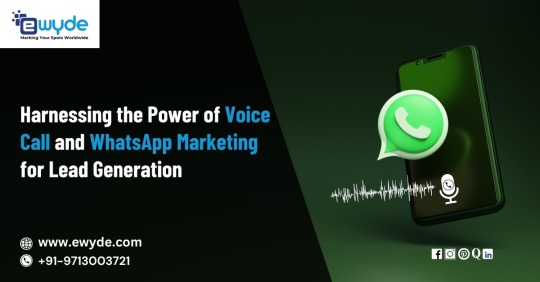
In the dynamic landscape of digital marketing, businesses are increasingly turning to innovative strategies like voice call marketing and WhatsApp marketing to generate leads effectively. These methods not only facilitate direct communication but also foster engagement and build relationships with potential customers. Let’s explore how voice call and WhatsApp marketing can elevate your lead generation efforts.
Voice call marketing remains a potent tool for businesses seeking personalized engagement with their audience:

Direct Communication: Unlike other forms of communication, a voice call offers a personal touch that can significantly influence a prospect’s decision-making process.
Building Trust: Establishing trust is crucial in converting leads. A voice call allows businesses to address concerns directly and build rapport.
Strategies for Effective Voice Call Marketing:

Segmentation: Target specific customer segments with tailored messages to enhance relevance and response rates.
Follow-Up: Use voice calls to follow up on leads generated through other channels, such as email campaigns or social media interactions.
Scripting and Training: Equip your team with well-crafted scripts and adequate training to handle calls professionally and persuasively.
WhatsApp Marketing: Instant Connectivity

WhatsApp has emerged as a powerful platform for marketing and customer engagement:
High Engagement Rates: Messages sent via WhatsApp tend to have higher open rates compared to traditional email marketing.
Rich Media Capabilities: Share images, videos, and documents to enrich your communication and showcase products or services effectively.
Effective WhatsApp Marketing Strategies:

Opt-In Campaigns: Obtain consent from users to receive WhatsApp messages, ensuring compliance with privacy regulations.
Broadcast Lists: Send personalized messages to targeted lists of contacts, offering exclusive promotions or updates.
Customer Support: Provide instant customer support through WhatsApp, resolving queries promptly and enhancing customer satisfaction.
Integrating Voice Call and WhatsApp Marketing:
To maximize lead generation efforts, consider integrating voice call and WhatsApp marketing strategies:
Multi-Channel Approach: Use voice calls to initiate contact and WhatsApp to nurture relationships and provide ongoing engagement.
Automated Follow-Ups: Implement automated workflows to seamlessly transition leads from voice calls to WhatsApp for continued communication.
Conclusion
Voice call and WhatsApp marketing represent potent tools in the marketer’s arsenal, offering unique opportunities to connect with prospects on a personal level and nurture leads effectively. By leveraging these strategies intelligently and integrating them into your overall marketing strategy, businesses can enhance their lead generation efforts, foster customer relationships, and drive sustainable growth.
Ready to Boost Your Lead Generation?
Explore the power of voice call and WhatsApp marketing today and discover how these strategies can transform your business. Contact us to learn more about implementing effective lead generation campaigns that leverage these dynamic communication channels. Let’s take your marketing to the next level!
0 notes
Text
The Future of AI in 2024: Innovations, Challenges, and Opportunities
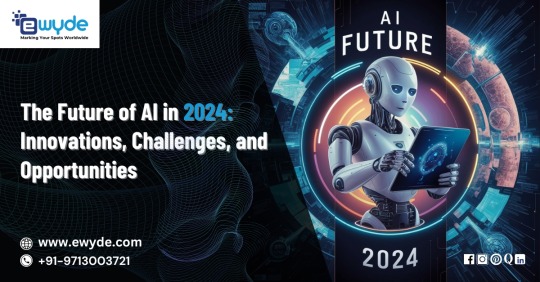
Artificial Intelligence (AI) has been a transformative force in various industries, and 2024 is set to be a pivotal year for its development. From advancements in machine learning algorithms to ethical considerations and new applications, AI continues to shape our future in unprecedented ways. Here’s a deep dive into what we can expect from AI in 2024.
Advancements in Machine Learning and AI Models

In 2024, we are witnessing significant improvements in machine learning and AI models. These advancements are driven by:
Enhanced Algorithms: Researchers are developing more sophisticated algorithms that can learn and adapt more efficiently.
Quantum Computing: The integration of quantum computing is set to revolutionize AI by solving complex problems faster than ever before.
Increased Data Availability: The exponential growth of data provides AI models with more information to learn from, leading to better predictions and insights.
AI in Everyday Life

AI continues to permeate our daily lives, offering convenience and efficiency:
Smart Homes: AI-powered devices are making homes smarter and more responsive, from voice-activated assistants to intelligent climate control systems.
Healthcare: AI is playing a crucial role in diagnostics, personalized medicine, and patient care management, improving outcomes and reducing costs.
Transportation: Autonomous vehicles and AI-driven traffic management systems are enhancing road safety and reducing congestion.
Ethical Considerations and AI Governance

As AI technologies advance, ethical considerations and governance become increasingly important:
Bias and Fairness: Ensuring AI systems are free from bias and promote fairness is a critical focus. Researchers are developing methods to identify and mitigate biases in AI algorithms.
Privacy: Protecting user data and ensuring privacy is paramount. AI systems must be designed with robust security measures to prevent data breaches.
Regulation: Governments and organizations are working on frameworks to regulate AI development and deployment, balancing innovation with safety and ethics.
AI in Business and Industry

Businesses across various sectors are leveraging AI to drive growth and efficiency:
Finance: AI is revolutionizing financial services through predictive analytics, fraud detection, and automated trading systems.
Retail: Personalized shopping experiences and inventory management are being enhanced by AI, leading to increased customer satisfaction and operational efficiency.
Manufacturing: AI-driven automation and predictive maintenance are streamlining production processes and reducing downtime.
Challenges Ahead
Despite the remarkable progress, AI faces several challenges:
Interoperability: Ensuring different AI systems can work together seamlessly is a significant hurdle.
Scalability: Developing AI models that can scale efficiently across different applications and environments is a key challenge.
Skill Gap: There is a growing demand for AI talent, and addressing the skill gap is essential for sustained innovation.
Opportunities for Innovation
The future of AI holds immense potential for innovation:
AI and Sustainability: AI can contribute to sustainability efforts by optimizing energy usage, reducing waste, and promoting green technologies.
Human-AI Collaboration: Enhancing collaboration between humans and AI systems can lead to better decision-making and creative problem-solving.
New Frontiers: AI is poised to explore new frontiers, from space exploration to deep-sea research, unlocking new possibilities for discovery and advancement.
Conclusion
AI in 2024 is marked by rapid advancements, ethical considerations, and a plethora of opportunities. As we navigate this transformative era, it is crucial to foster responsible AI development that prioritizes human well-being and societal progress. The future of AI is bright, and with careful stewardship, it has the potential to revolutionize every aspect of our lives.
Call to Action: Stay ahead of the AI revolution! Subscribe to our newsletter for the latest updates and insights on AI advancements and how they can benefit you and your business.
1 note
·
View note